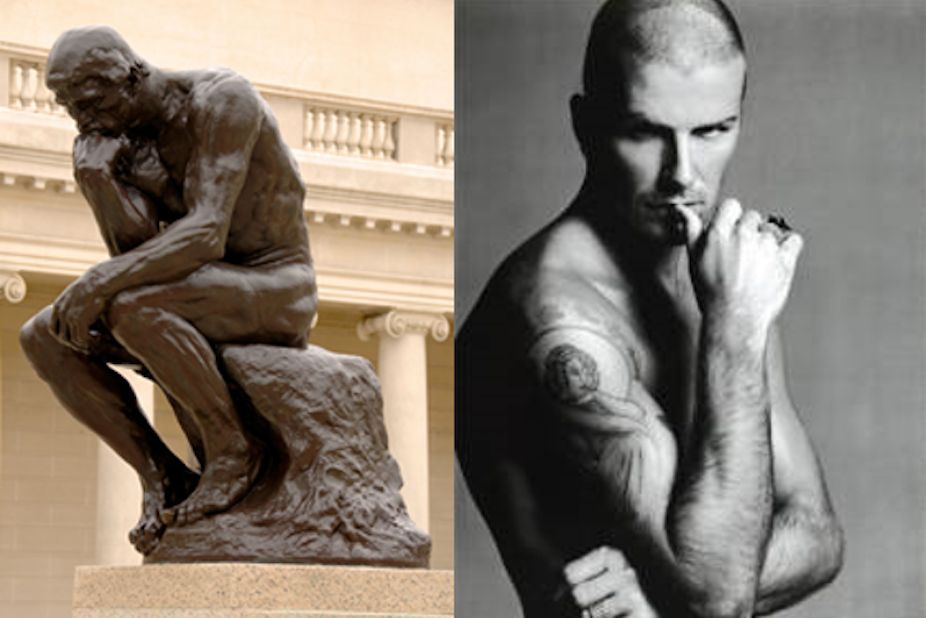A student came up to me after class the other day and said, “So what is this ‘Becksistentialism’ all about then?” I want to begin to answer that question by defining the negative: Sir Alex Ferguson is not a Becksistentialist.
Consider what he has been saying about Becks in the wake of his new (or revised) autobiography: “David was the only player I managed who chose to be famous, who made it his mission to be known outside the game.” He has a whole variety of complaints, including, notably, that Beckham refused to take his beanie hat off at a dinner. And of course he has a go at just about everyone else too (for example, Roy Keane). But I want to zero in on his comments about Beckham, because they help us to understand not just the enigma that is Beckham but our own experience as human beings.
“He could have been a Manchester United legend.” But Beckham – just as he refuses to take the beanie hat off – revolts against the Ferguson vision. Ferguson wants him to become a god. Not just a footballer. But The Footballer. A living legend. But, of course, at the same time subordinate to Man U. So it is in part a power move – Fergie rules.

But the Becksistentialist naturally refutes this simplistic and tyrannical thinking. I want to argue that Beckham – for all his visibility and connectedness - is in fact the great Outsider figure de nos jours. A rebel. And a champion of self-liberation. The beanie at the dinner table to me represents what Emile Durkheim calls “anomie” – the state of “normlessness” in which we float free from the rules of society.
It is not the case that David Beckham became an existentialist the day he joined Paris Saint-Germain at the beginning of this year. He was already an existentialist. It was in Paris that he became more self-aware. The existentialist is born out of crisis. Everyone has crises. Beckham’s tend to be a bit more visible and therefore susceptible to analysis. I happened to witness his primal crisis at close quarters.
The red card in the 1998 World Cup in France – Le Mondial – when he was sent off for retaliation. England v Argentina. Beckham had been benched for the first two games by Glenn Hoddle, who suspected him of being distracted by (the then) Posh Spice and too much show-business. Like Ferguson, Hoddle is an essentialist who believes in the soul and karma: and thinks that Beckham has to be pure Footballer and nothing else and is duly punished for not being it.
And so we come to St Etienne and Argentina (a match also notable also for the miraculous Michael Owen solo goal). The two teams are level at 2-2. Then, a minute into the second half (I was just sitting down with a drink in my hand), Diego Simeone clatters into Beckham. And the foot famously goes up. And the red card comes out. But was it “intentional” or wasn’t it?
To be is to do
Jean-Paul Sartre would say: of course that kick is intentional; there is no unconscious, everything we do is intentional, deliberate, voluntary. Including falling in love and jealousy. There is no such thing as a “crime passionnel” or “I couldn’t help myself, your honour”. Does Beckham take the easy way out? There is a fascinating interview conducted by Zinedine Zidane (asking the questions in French) in which Beckham offers a classic Becksistentialist commentary.

Of course, he argues, he could have not kicked Simeone. And perhaps England could then have gone on to win the World Cup as well. But he accepts and asserts responsibility for it. I am the author of my acts, says Beckham. I am what I do. (The French subtitles have: je ne regrette rien). He is in some paradoxical way proud of his mistakes. In other words, Beckham appears to be arguing – you have to act as if it were intentional – and the deed becomes part of your narrative.
As a result of this sending off, the great rule-breaker, Becks the rebel becomes Public Enemy no 1 for a spell. When he gets back to England he finds that he is held responsible for the World Cup exit. It is all his fault. The question he asks himself is – does everyone hate me? Am I the Bad Guy in all this. And he says, Yes, I am. He claims authorship. Go on, hate me.
Football, without question
His answer reminds me of Jean Genet, the great writer and thief and inverti (or “queer” in French street slang). I chose to be a criminal. I am not going to ascribe responsibility to some faceless impersonal forces – genetic fate or determinism or social deprivation. You have to act as if it were intentional.

But of course Beckham is not a pre-eminently verbal philosopher. A lot of his thinking is expressed through the medium of the tattoo (Confucius) and the haircut (inconstant). I see his career overall as in some ways like Voltaire’s Candide – a critique of naïve optimism. The relationship of individual player to the team raises the ghost of the Sartre’s “group-in-fusion”. But maybe the final question to be asked is: “Whither Becks?” His fundamental Becksistential statement, “I am not what I am and am what I am not” suggests a career not just as “ambassador” but also as spy. Perhaps Victoria Beckham’s suggestion that he would make a good James Bond is not so far off the mark.
Andy Martin is delivering a talk on Becksistentialism as part of the Cambridge Festival of Ideas, October 26, 11.30am-1pm, West Road, Cambridge.

